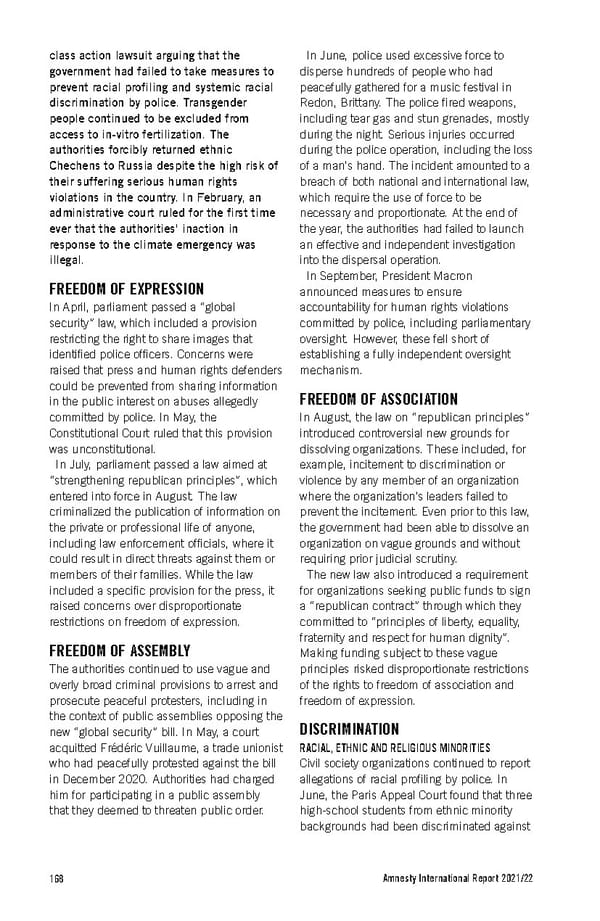class action lawsuit arguing that the In June, police used excessive force to government had failed to take measures to disperse hundreds of people who had prevent racial profiling and systemic racial peacefully gathered for a music festival in discrimination by police. Transgender Redon, Brittany. The police fired weapons, people continued to be excluded from including tear gas and stun grenades, mostly access to in-vitro fertilization. The during the night. Serious injuries occurred authorities forcibly returned ethnic during the police operation, including the loss Chechens to Russia despite the high risk of of a man’s hand. The incident amounted to a their suffering serious human rights breach of both national and international law, violations in the country. In February, an which require the use of force to be administrative court ruled for the first time necessary and proportionate. At the end of ever that the authorities’ inaction in the year, the authorities had failed to launch response to the climate emergency was an effective and independent investigation illegal. into the dispersal operation. FREEDOM OF EXPRESSION In September, President Macron announced measures to ensure In April, parliament passed a “global accountability for human rights violations security” law, which included a provision committed by police, including parliamentary restricting the right to share images that oversight. However, these fell short of identified police officers. Concerns were establishing a fully independent oversight raised that press and human rights defenders mechanism. could be prevented from sharing information FREEDOM OF ASSOCIATION in the public interest on abuses allegedly committed by police. In May, the In August, the law on “republican principles” Constitutional Court ruled that this provision introduced controversial new grounds for was unconstitutional. dissolving organizations. These included, for In July, parliament passed a law aimed at example, incitement to discrimination or “strengthening republican principles”, which violence by any member of an organization entered into force in August. The law where the organization’s leaders failed to criminalized the publication of information on prevent the incitement. Even prior to this law, the private or professional life of anyone, the government had been able to dissolve an including law enforcement officials, where it organization on vague grounds and without could result in direct threats against them or requiring prior judicial scrutiny. members of their families. While the law The new law also introduced a requirement included a specific provision for the press, it for organizations seeking public funds to sign raised concerns over disproportionate a “republican contract” through which they restrictions on freedom of expression. committed to “principles of liberty, equality, FREEDOM OF ASSEMBLY fraternity and respect for human dignity”. Making funding subject to these vague The authorities continued to use vague and principles risked disproportionate restrictions overly broad criminal provisions to arrest and of the rights to freedom of association and prosecute peaceful protesters, including in freedom of expression. the context of public assemblies opposing the DISCRIMINATION new “global security” bill. In May, a court acquitted Frédéric Vuillaume, a trade unionist RACIAL, ETHNIC AND RELIGIOUS MINORITIES who had peacefully protested against the bill Civil society organizations continued to report in December 2020. Authorities had charged allegations of racial profiling by police. In him for participating in a public assembly June, the Paris Appeal Court found that three that they deemed to threaten public order. high-school students from ethnic minority backgrounds had been discriminated against Amnesty International Report 2021/22 168
 Amnesty International Report 2021/22 Page 167 Page 169
Amnesty International Report 2021/22 Page 167 Page 169